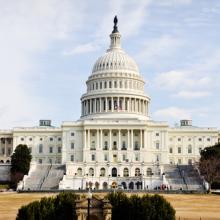moral budget
Once we have decided to follow Jesus, we cannot help but live out our personal beliefs in public ways. The demands of the Gospel refuse us the option of a purely inward spirituality.
While there are times when those in power listen to the guidance of moral and religious leaders, far too often we’re asked to be prophets. In the face of opposition, we pick up our crosses and lift up our voices on behalf of the disadvantaged.
In North Carolina, pastors and civil rights leaders, along with thousands of others, have been living out their personal faith in a very public way. Since late April, dozens of faith leaders and hundreds of others have been arrested at the state capitol as part of an ongoing protest call “Moral Mondays.” What would motivate these leaders to take such a strong stand at such a personal cost?
NEW YORK — The “Nuns on the Bus” are revving up their engines for another national campaign, only this time the Catholic sisters are taking their mobile platform for social justice along the country’s Southern border to push Congress to pass immigration reform.
“The ‘Nuns on the Bus’ is going on the road again!” Sister Simone Campbell, head of the social justice lobby Network, told an enthusiastic gathering of faith leaders and charity activists at a Manhattan awards ceremony Wednesday (May 1).
“This time we’re going out for commonsense immigration reform,” she said to rousing applause.
While immigration and gun violence issues are capturing most of the week's headlines, the budget battles have re-emerged in Washington, D.C. Last month House Budget Chairman Paul Ryan (R-Wis.) and Senate Budget Chairwoman Patty Murray (D-Wash.) released competing budget proposals. And today, President Barack Obama released his own plan, which aims to reduce the deficit through a combination of spending cuts and revenue increases.
As The Washington Post's Ezra Klein and Evan Soltas note:
Today’s budget is the White House’s effort to reach the bedrock of the fiscal debate. Half of its purpose is showing what they’re willing to do. They want a budget compromise, and this budget proves it. There are now liberals protesting on the White House lawn. But the other half is revealing what the GOP is — or, more to the point, isn’t — willing to do. Republicans don’t want a budget compromise, and this budget is likely to prove that, too.
As the White House sees it, there are two possible outcomes to this budget. One is that it actually leads to a grand bargain, either now or in a couple of months. Another is that it proves to the press and the public that Republican intransigence is what’s standing in the way of a grand bargain.
The book of Jeremiah straddles the most momentous event of Israel’s history: the destruction of Jerusalem and its temple and the exile of its leaders to Babylon (586 B.C.E.). In the first half of the book of Jeremiah, the prophet announces that God is furious with the people of Judah, in particular its leaders, because they have reneged on the covenant they made with God through Moses. They have not taken care of the poor, and they have not lived according to the stringent demands to worship God alone.
Not surprisingly, the leaders do not want to hear Jeremiah’s critiques of their ways of doing business. No politician wants to look weak – even before a god. According to Jeremiah, the leaders of Judah have prioritized – not the building of an ethical community – but their own comfort and position. Their desire to maintain their own power and influence has trumped everything. And these politicians have justified their behavior so many times and in so many ways, they don’t even recognize how far they have fallen from the ideal that guided the building of the nation.
A few weeks ago, members of the House spoke out against the House Agriculture Committee’s vote to cut SNAP benefits to working class Americans. On Wednesday, Sen. Tom Harkin (D-Iowa) rallied on the Senate-side to restore balance to the budget debate and avoid sequestration in conjunction with a report on the effects of such cuts.
The premise of the current debate is that all the cuts have to come from the non-military, discretionary budget. Harkin reported that since we last had a balanced budget (Clinton-era), discretionary funds have risen 0 percent as opposed to a 73 percent increase in the Pentagon budget.
We have two sets of rules, he said. One set for the rich, and another set for the rest of America. This equals out to tax cuts for the rich and budget cuts for the poor and middle class.
Do we want to be the kind of America that faces an historic deficit and chooses to extend $690 billion in tax cuts for the wealthiest 2 percent of our citizens while cutting $650 billion in aid to children who need special education, student aid, and additional resources for low-income schools?
Do we want to be the kind of America that protects $44 billion in subsidies for oil and gas companies while cutting $47 billion in energy grants to help poor families heat their homes in the winter?
Right now the wealthiest Americans are wealthier than they’ve ever been and people living beneath the poverty line make up a larger slice of the American pie than they have since the Great Depression.
Is that really what we want? Really?
At noon TODAY (Wednesday 11/16) in every time zone faith leaders, parishioners, advocates, community lead-ers, and their constituents will come together to join hands and create human circles around agencies and programs at risk of deep budget cuts in the supercommittee and appropriations processes.
The Circles will form in towns and cities across the country at 12 noon in every U.S. time zone. Through this rolling national action, people of faith will signal to the congressional super committee and all congressional representatives that the nation’s budget must not be balanced on the backs of “the least of these” (Matthew 25:40).
This week, the Senate will vote on H.R. 2354, an appropriation bill that will determine the amount of funds we allocate for poverty-related development assistance. There are a number of amendments proposed that will severely cut this aid, which currently helps millions of the world's poorest and most vulnerable. The bottom 1 percent, if you will.
A (usually) twice-daily round up of news related to Sojourners commitments to social justice and the poor.
Organized Labor Will Continue Standing With Evicted Protesters. Sentamu Hits Out At Greed Culture Of Fat Cats. Does Immigration Fuel Crime? Without Statistical Consensus, Rhetoric And Fear Reign In Debate. Occupying History. Faith Plays Role In Occupy Wall Street Sense Of Morality. Immigrants And English Acquisition. People Reject National Banks, Want To Go Local. OpEd: On the Rise in Alabama. Why the Religious Right Can’t Seem to Get the Candidate It Wants. A New Battle For Religious Freedom? Keystone XL Is Delayed — So Where's The Oil Going Now? OpEd: Is Rick Perry’s Zero Foreign Aid Plan Feasible? Desirable?
Right now, in cities around the world, there is a growing protest movement putting the issue of economic inequality squarely on the public agenda. Regardless how you feel about this movement, I believe there is another "99 percent" we need the G20 – and urgently Congressional leaders – to remember and prioritize.
Nearly 8 million children under the age of five die every year due to preventable malnutrition and disease. But they are not dying in the United States, Germany or here in France.
According to research by World Vision’s Child Health Now campaign, 99 percent of those entirely preventable deaths take place in developing countries. The 99 percent of the children that die under the age of 5 are too often invisible and don't have a voice at major global summits such as the G20 or in the corridors of Congress. These children constitute the real and too often forgotten 99 percent.
Human trafficking and sex slavery thrives in the U.S. and abroad. Census Bureau measure more Americans living in poverty. Debate brews over new method of measuring poverty. Poll finds voters deeply torn. Faith important in 2012 presidential election, but skepticism about Mormonism remains. Health tab for climate change: $14 billion. What do the Copts mean for Arab Spring?
Interfaith Worker Justice has published a Prayer Service designed to help people reflect on a moral economy within the context of their religious tradition. Written for clergy and religious leaders, the prayer service is aimed for those Occupying Wall Street and other cities, and for congregational use.
As you are reading this, the Congressional Joint Select Committee on Deficit Reduction (a.k.a. The Super Committee) is making choices about who and what our nation will protect.
Will we protect the wealthiest 2 percent by preserving $690 billion in Bush era tax cuts?
Or will we protect children by preserving $650 billion in special education, student aid, and assistance to low-income schools?
Will we protect corporations by preserving $97.5 billion in subsidies for big business or will we protect families by preserving $98 billion in Head Start and child care programs?
We have 32 days left to remind Congress that, "Oppressing the poor in order to enrich oneself, and giving to the rich, will lead only to loss" (Proverbs 22:16).










